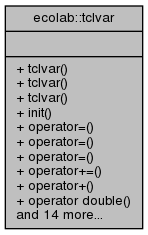TCL variable class. More...
#include <tcl++.h>

Public Member Functions | |
| tclvar (const string &nm, const char *val=NULL) | |
| TCL var name this i sbound to. If val not null, then initialise the var to val. | |
| tclvar (const string &nm, const string &val) | |
| void | init (const char *val=NULL) |
| tclvar | operator= (double x) |
| tclvars may be freely mixed with arithmetic expressions | |
| tclvar | operator= (const char *x) |
| tclvar | operator= (const string &x) |
| tclvar | operator+= (const string &x) |
| string | operator+ (const string &x) |
| operator double () | |
| operator const char * () | |
| operator int () | |
| operator unsigned () | |
| double | operator++ () |
| double | operator++ (int) |
| double | operator-- () |
| double | operator-- (int) |
| double | operator+= (double x) |
| double | operator-= (double x) |
| double | operator*= (double x) |
| double | operator/= (double x) |
| tclvar | operator[] (int index) |
| arrays can be indexed either by integers, or by strings | |
| tclvar | operator[] (const string &index) |
| arrays can be indexed either by integers, or by strings | |
| int | size () |
| size of arrays | |
Friends | |
| class | tclindex |
| bool | exists (const tclvar &x) |
| Check if a TCL variable exists. | |
TCL variable class.
A class implementing the concept of a TCL variable. Here, if the programmer declares
tclvar hello="hello";
then the variable hello can be used just like a normal C variable in expression such as
floatvar=hello*3.4.
However the difference is that hello is bound to a TCL variable called hello, which can be accessed from TCL scripts.